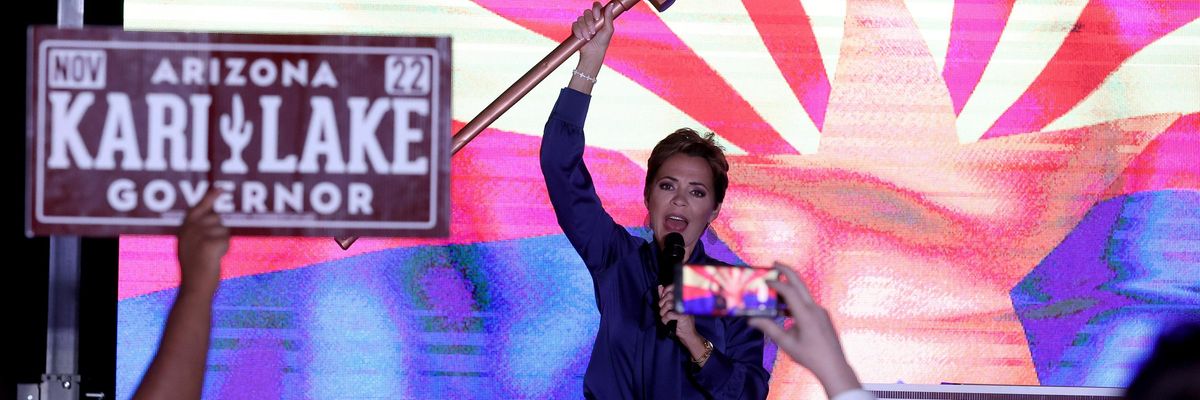In six key battleground states that played a decisive role in the 2020 presidential race, Republican candidates who have openly embraced former President Donald Trump's "Big Lie" have won nearly two-thirds of the GOP nominating contests for positions with power over state and federal elections, a potentially seismic threat to democracy.
According to a Washington Postanalysis published Monday, 54 of 87 Republican nominees for key posts in Arizona, Georgia, Michigan, Nevada, Pennsylvania, and Wisconsin have denied the legitimacy of President Joe Biden's 2020 election victory.
"A close presidential contest that comes down to the outcome in states where officials are willing to try to thwart the popular will could throw the country into chaos."
"Had those candidates held power in 2020, they would have had the electoral clout to try something that the current officeholders refused: overturning the vote and denying Biden the presidency," the Post notes. "Whether they could have succeeded in practice is a matter of vigorous debate among scholars, who cite the potential for court challenges and other means of upholding the results."
"But the experts agree on one thing: A close presidential contest that comes down to the outcome in states where officials are willing to try to thwart the popular will could throw the country into chaos," the newspaper adds. "It would potentially delay the result, undermine confidence in the democratic system, and sow the seeds of civil strife on a scale even greater than what the nation saw on January 6, 2021."
Trump, who is gearing up for a possible 2024 run as he's under criminal investigation by the Justice Department, has endorsed and campaigned for many of the candidates featured in the Post's analysis, including Arizona gubernatorial candidate Kari Lake--a former TV news anchor whose incessant lies about the 2020 election catapulted her to a win in the GOP primary earlier this month, delighting the former president.
Even in victory, Lake lashed out at the Arizona election process, complaining that the results "took longer than they should have."
The Post's analysis confirms that Arizona, a state Biden carried narrowly in 2020, is a bastion of election denial on the GOP side: 12 of 13 Republican nominees for state and federal offices there have questioned the election, including the chosen candidate for secretary of state.
Noah Bookbinder, president of Citizens for Responsibility and Ethics in Washington, called the rise of GOP election deniers across the U.S. "the biggest story not enough people are watching."
"This is how our democracy could crumble, quickly and quietly," Bookbinder warned.
The notion that Biden was elected illegitimately is broadly popular with Republican voters, according to recent opinion surveys. As the Post points out, "The predilection among Republican primary voters toward candidates who deny the result of the last election extends well beyond Michigan, Pennsylvania, and Arizona--three states that together accounted for 47 electoral votes in 2020, more than enough to flip the last election to Trump."
Ian Vandewalker, senior counsel at the Brennan Center for Justice, wrote in a blog post earlier this month that "the Big Lie that the election was stolen from Trump has been pushed by powerful politicians, starting with Trump himself."
"But it may be leaders closer to home who have the greatest ability to affect the popularity of election denial among the people of their state," he added.
One prominent Republican officeholder that is actively boosting election deniers is Florida Gov. Ron DeSantis, a possible 2024 presidential contender.
The Orlando Sentinelreported last week that DeSantis is "set to appear at rallies for Pennsylvania GOP governor's candidate Doug Mastriano, Arizona candidate for governor Kari Lake, and U.S. Senate candidate Blake Masters, all of whom have denied Biden's win and falsely claimed election fraud.
DeSantis was one of the first Republicans to suggest state legislatures could overrule voters to choose Trump.
"Appearing on Fox News on November 5, two days after the election," the Sentinel observed, "he said 'presidential electors are done by the legislators and the schemes they create and the framework. And if there's departure from that, if they're not following law, if they're ignoring the law, then they can provide remedies as well.'"
The Republican Party's elevation of fervent election deniers--often with the support of dark money--in battleground states and nationwide has dramatically raised the stakes of the upcoming November contests, given that they could usher into power officials willing to subvert the democratic process to secure their desired outcome.
Wisconsin offers an illustrative example of November's implications. As the New York Timesreported Monday, "The governor's race this fall, along with a pivotal State Supreme Court contest next spring, will decide whether Republicans can solidify their grip on the swing state and remake its voting laws."
"Nowhere in the country have Republican lawmakers been more aggressive in their attempts to seize a partisan edge than in Wisconsin," the Times noted. "Having gerrymandered the Legislature past the point that it can be flipped, they are now pushing intensely to take greater control over the state's voting infrastructure ahead of the 2024 presidential contest."

